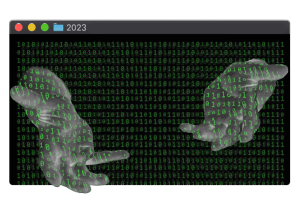How will ChatGPT harm us in the future?
March 6, 2023
ChatGPT has taken a prevalent spot amongst controversial topics as it begins to raise questions of integrity both in school and beyond. Its use poses a massive series of problems, namely that ChatGPT encourages laziness and promotes generic work in schools and workplaces, highlighting its downfall to society.
Despite what many think, ChatGPT does not come up with original knowledge and ideas. It is fed massive amounts of information from an existing set of data and then associates similar words and phrases together to form human-like sentences. It takes one word and searches for high probability words associated with it to generate writing that appears like it makes sense, making readers think it knows what they are asking.
With this, the software is able to generate what teachers have referred to as “C-level writing” in terms of school writing, obtaining enough quality for students to hand in and still receive a passing grade. While academic integrity is preached in schools, ChatGPT serves as a loophole for students to get by without having to actually do the work. This can be detrimental to learning, especially in English, reading and grammar classes in which students can pay less attention in the classroom and get their assignments done through the website.
West Essex and many other schools currently have ChatGPT blocked on all school devices, which only prompts students to access their home devices or cellphones instead. It is inevitable that students will use ChatGPT to their short-term advantage, even though it threatens to put them at a huge disadvantage in the long run. Yes, ChatGPT can earn them completion points and give students an easy way out of learning, but it sets them up to learn things the hard way once this writing is no longer acceptable with their level of schooling.
The issues with ChatGPT, however, extend far past the classroom. It also raises many concerns in the workplace, with questions of whether employees will use this to create emails, pitches, presentations and more. Using generated responses can be very dangerous if important details are left out of writing or incorrectly added, and ill equipped and insufficient responses will start to alienate the companies we depend on for information.
“I fear AI being used to simulate journalism in the interest of cutting costs or keeping up with a ravenous 24-hour news cycle,” Mike Johnson, district network administrator said. “A next-level ChatGPT writing news articles would be biased by the information it was fed, would fail to ask investigative questions of the facts it was reporting or could simply misrepresent those facts based on a failure of context in its knowledge base.”
AI has potential, yes, but it’s clearly far too untested and unrestrained to have such a prominent place in society. Overusing ChatGPT to generate writing instead of actually learning to do it ourselves will lead to a society lacking creativity and originality. Schools will lose their challenging nature. ChatGPT also stunts the abilities necessary to completing tasks to that of just maneuvering its website.
“I think it’s scary that we’ve become so dependent on technology to the point where people can’t even write their own essays,” senior Claudia Marino said.
Some students agree that ChatGPT can threaten their future as well.
“I think it’s scary when you look to the future for jobs,” junior Marlee Perlmutter said. “So many jobs can be taken over by AI, and I don’t know what’s going to happen.”
It’s still unclear what we as a school and we as a society should do with the tech, but ChatGPT and other AI models like it pose far too much risk to be fully trusted.


